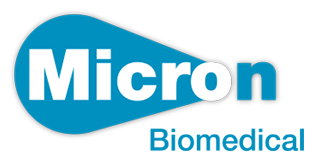Micron Biomedical Announces Positive Measles and Rubella Vaccination Results from First Clinical Trial of Microarray Injection-Free Vaccine Delivery in Children

ATLANTA, May 17, 2023 /PRNewswire/ — Micron Biomedical, a life science company developing first-in-class dissolvable microarray-based products that simplify and improve the administration, transport, and storage of drugs and vaccines, today announced positive Phase 1/2 data from the first-ever clinical trial of microarray technology in children including infants as young as 9 months old.
The study, which evaluated the safety, immunogenicity, and acceptability of the leading commercially available measles-rubella (MR) vaccine from the Serum Institute of India delivered by Micron’s microarray technology in adults, toddlers and infants, was presented today at the MICRONEEDLES 2023 conference in Seattle, Washington.
“Micron, with support from the Bill & Melinda Gates Foundation and the CDC, is thrilled to accomplish a major milestone in the future of injection-free administration of necessary and potentially life-saving vaccines and therapeutics,” said Steven Damon, CEO of Micron Biomedical. “With this completed Phase 1/2 clinical trial in children, in addition to other completed and ongoing Phase 1 and Phase 2 clinical trials, Micron remains at the forefront of the effort to bring microarray-based drug and vaccine products to market.”
In many low- and middle-income countries (LMICs), the MR vaccine coverage rate remains well below the threshold recommended by the World Health Organization (WHO) to sustain disease elimination. Micron’s dissolvable microarray technology, in which vaccines are embedded, is designed to overcome critical logistical vaccination challenges that exist in LMICs and to increase access to life-saving vaccines.
“These are exciting results which show, for the first time, the potential for microarray patches to safely and effectively deliver vaccines to children,” added Ed Clarke, FRCPCH, PhD, Head of Infant Immunology at Medical Research Council, The Gambia (MRCG).
Funded via a grant from the Bill & Melinda Gates Foundation, the study was conducted at the Medical Research Council Unit in The Gambia (“MRCG”), part of the London School of Hygiene and Tropical Medicine (“LSHTM”), under the leadership of Dr. Clarke.
Study Details
In the trial, 45 adults, 120 toddlers (15-18 months old) and 120 infants (9-10 months old) were enrolled in an age de-escalation fashion and randomized to receive MR vaccine either by Micron’s microarray or by subcutaneous (SC) injection.
Vaccination by microarray was safe and well tolerated with no allergic reactions or related serious adverse events. Day-42 immunogenicity showed high and similar seroprotection rates for measles and rubella in all cohorts for both the microarray (93.2% – 100%) and SC injection (89.8% – 100%) groups and in infants who were MR-vaccine naïve at the start of the trial, seroconversion rates were high and similar for both the microarray (92.9% -100%) and SC injection groups (89.7%-100%). Over 90% of the parents of toddlers and infants enrolled in the trial who took part in an acceptability survey said that the microarray technology would be better than SC injection to give vaccines to children.
The technology aims to significantly simplify the transport, storage and administration of vaccines that are traditionally delivered via injection and eliminates sharps waste.
“Supporting innovations in vaccine delivery is critical to addressing ongoing health inequities,” said James Goodson, Senior Scientist and Epidemiologist in the Global Immunization Division at the Centers for Disease Control and Prevention (CDC), and co-investigator for the study. “This clinical trial is an important step forward in the critical development pathway for the MR microarray patch toward licensure, and a major contribution that may help shape future approaches to reaching children and families with life-saving vaccines around the world.”
About Micron Biomedical
Micron Biomedical is the leader in the field of dissolvable microarray-based, drug and vaccine administration technology. Micron Biomedical is a clinical stage life science company on a rapid path to commercializing its proprietary applicator-free, dissolvable, microarray technology. Micron’s technology is designed to improve access and achieve better health outcomes globally through injection free, painless, and simple and/or self-administration of drugs and vaccines, and by eliminating or reducing the need for cold chain transport and storage, enhancing safety and efficacy, and improving patient compliance. Micron partners with and/or receives funding from private and public pharmaceutical and biotech companies, the Bill & Melinda Gates Foundation, the Centers for Disease Control and Prevention (CDC)*, UNICEF, PATH and the Georgia Research Alliance.
For more information visit www.micronbiomedical.com
*Involvement of the Department of Health and Human Services or the Centers for Disease Control and Prevention does not serve as an actual or implied endorsement of the general policies, activities, or products of Micron Biomedical.
Media Inquiries:
Micron Biomedical, Inc
Public Relations
pr@micronbiomedical.com
SOURCE Micron Biomedical, Inc.




